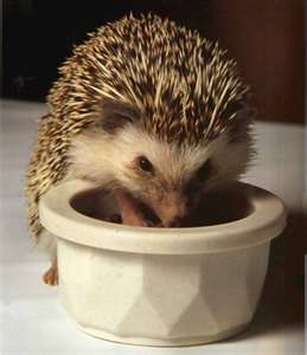WARNING!!! Hedgehogs are NEVER to have a vet administer Ivermectin. Ivermectin will cause serious health
issues with the hedgehog and usually results in suffering and death. If you buy a hedgehog from Pepper's
Hedgehogs and allow a vet to use Ivermectin....the health guarantee is null and void.
What is a Hedgehog?
Hedgehogs are a small, insectivorous (insect eating) mammal that can be found
throughout the world. They are native to England, Europe, Africa and Asia. The
hedgehogs typically found in the pet trade of North America are generally a
hybrid of two species, the central African hedgehog and the Algerian hedgehog.
Since there are no native species of hedgehog in either Canada or the United
States, many people still mistake the domestic hedgehog for the porcupine - an
entirely different and unrelated animal. While porcupine quills are extremely
sharp, barbed and very dangerous, the hedgehog quill is smooth and not nearly
as sharp. Petting a friendly hedgehog can be compared to petting a hairbrush -
bristly, not prickly.
Adult hedgehogs typically weigh between 350 to 450 grams with a healthy range
(depending on the body habitus) between 220 and 1,000 grams. Compared to other
small animals, they have very little odor and are not likely to bite (though
they can). They have soft, furry bellies and a coat of rough quills on their
back. They roll up in a ball to protect themselves when they are frightened or
annoyed, and can prickle when in this mode.
Hedgehogs are intelligent and each has its own personality. They are often
solitary in the wild, but may adjust well to interaction with humans. Toys such
as flat, solid surfaced running wheels, toilet paper tubes, or kitty toys can
entertain them. Many hedgehogs even learn to use a litter box.
Hedgehogs are not rodents and they do not chew on things. Their life span is
approximately 4 to 6 years and they come in a variety of colors.
Is a Hedgehog for Me?
issues with the hedgehog and usually results in suffering and death. If you buy a hedgehog from Pepper's
Hedgehogs and allow a vet to use Ivermectin....the health guarantee is null and void.
What is a Hedgehog?
Hedgehogs are a small, insectivorous (insect eating) mammal that can be found
throughout the world. They are native to England, Europe, Africa and Asia. The
hedgehogs typically found in the pet trade of North America are generally a
hybrid of two species, the central African hedgehog and the Algerian hedgehog.
Since there are no native species of hedgehog in either Canada or the United
States, many people still mistake the domestic hedgehog for the porcupine - an
entirely different and unrelated animal. While porcupine quills are extremely
sharp, barbed and very dangerous, the hedgehog quill is smooth and not nearly
as sharp. Petting a friendly hedgehog can be compared to petting a hairbrush -
bristly, not prickly.
Adult hedgehogs typically weigh between 350 to 450 grams with a healthy range
(depending on the body habitus) between 220 and 1,000 grams. Compared to other
small animals, they have very little odor and are not likely to bite (though
they can). They have soft, furry bellies and a coat of rough quills on their
back. They roll up in a ball to protect themselves when they are frightened or
annoyed, and can prickle when in this mode.
Hedgehogs are intelligent and each has its own personality. They are often
solitary in the wild, but may adjust well to interaction with humans. Toys such
as flat, solid surfaced running wheels, toilet paper tubes, or kitty toys can
entertain them. Many hedgehogs even learn to use a litter box.
Hedgehogs are not rodents and they do not chew on things. Their life span is
approximately 4 to 6 years and they come in a variety of colors.
Is a Hedgehog for Me?
- You will have to provide a high quality food and pay attention to special
dietary needs.
- You will need to clean their habitats daily with complete scrubbing done
weekly. Not all hedgehogs will litter train perfectly.
- Hedgehogs need to stay warm – 72 to 75 degree environmental temperature is
required.
- You will get poked. Even the best hedgehogs have off days.
- You will need to trim the hedgehog’s toenails even if they don’t want you
to.
- The hedgehog may self-anoint (spread spit on their self).
- A hedgehog who is not friendly to begin with will require a lot of patience
and respect to re-socialize.
- The hedgehog will be happier with an exercise wheel and a place to hide.
- If you do not handle the hedgehog frequently, they may not stay as friendly.
- A hedgehog may bite, though it is unlikely. Anything with teeth can bite.
- Not all veterinarians are familiar with hedgehogs, so it may be difficult or
expensive to secure good veterinary care.
- Hedgehogs often do not prefer the company of other hedgehogs.
- Your hedgehog may never seek you out for companionship. Some hedgies do, but
some do not.
- The hedgehog may like you better than other people. Some hedgehogs adjust
well to change, while others prefer the familiar.
- Your hedgehog will prefer to be awake at night. They can make a lot of noise
as they eat, drink and explore. Hedgehogs are largely nocturnal.
- If your hedgehog is a baby, it will go through a phase called “quilling,”
where a baby hedgehog is grumpy and loses baby quills.
I
Information provided by The International Hedgehog Association
Information provided by The International Hedgehog Association

